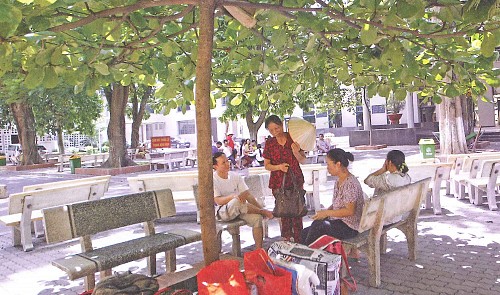Over recent years, several hospitals in Hanoi have served as a ‘home-sweet-home’ to wandering migrants who have eked out a living by seeing to in-patients on behalf of their own relatives and lived at the infirmaries all year round.
Stone benches near the entrance to Building 2 of Viet-Xo Hospital, located in Hai Ba Trung District, are always occupied by members of a ‘labor market,’ who tirelessly wait for their potential clients – in-patients and their relatives.
They are ‘professional’ care providers who are paid to tend to in-patients, particularly long-time, elderly and critically ill ones, around the clock, as these patients’ own children or relatives cannot afford the time do so.
Among them, Tan ‘lives’ in Viet-Xo Hospital, some 5.5 kilometers from his wife’s ‘workplace’ – Dong Da Hospital.
Over the past 10 years or so, the couple have done the job at different clinics and only see each other twice a year: during Tet (Vietnam’s Lunar New Year) and on his father’s death anniversary.
They live full-time inside the hospitals and sleep on collapsible chairs put along the corridors just like the patients’ loved ones.
When they are not working, they linger around the hospital premises by day, having cheap meals at sidewalk eateries nearby and taking showers and doing laundry in public restrooms.
Their only headache is finding a place to lie down for a rest at night.
Like many of his ‘colleagues,’ Tan generally hides his mattress and pillow in a fixed nook.
As night falls, he takes them out and dozes off anywhere such as an unused room or the space beneath staircases.
If he is detected and driven away by security guards, he will move to a hospital nearby for shelter.
Such healthcare facilities as Viet-Xo, Dong Da and 108 Military Central Hospital, which house large buildings and are riddled with nooks and crannies, are ideal for Tan and other caretakers to spend their nights.
A close look at a catappa tree near the entrance to Viet-Xo Hospital reveals some sedge mats hidden in the canopy.
Unlike other vagrants or migrant workers, members of the hired caretaking community usually look well-kempt, making it hard to tell them from their clients’ real relatives.
Their neat looks help them blend in as dedicated family members.
Paid VND300,000 (US$13) per day, Tan performs all chores ranging from feeding and bathing the patients to changing their diapers and cleaning their messes as skillfully as a hospital hygiene staffer does.
As for patients with moderate illnesses, he usually performs such tasks almost effortlessly.
However, he did not want to divulge ghastly details about those contracting critical illnesses or sustaining nasty wounds, as “that makes me nauseate.”
Insecure future
The ‘army’ of hired care providers has currently reached over 200 members, who are scattered throughout the hospital system throughout the capital.
Not all manage to find clients on a regular basis, with several being jobless for weeks at a time.
Tan and his wife reunite twice each year in their hometown – a small village in Cam Khe District in the northern province of Phu Tho.
A large hollow field sits at the heart of the district, once teeming with fish and a provider of second incomes, is now turned into an immense silvery sea during the rainy season, which comes around in July each year.
Like many others along the Hong (Red) River, one of the major rivers in northern Vietnam, the submerged paddy is rendered uncultivated for most of the time, except for one crop each year.
As incomes from the only crop are not sufficient, many have left their poor village next to the hollow field to scour for jobs in Hanoi.
A number of villagers have begun taking on the job of tending to in-patients at hospitals throughout the capital.
More than 100 villagers are now engaged in the job, making up almost half of the hired caretaking community at Hanoi infirmaries.
Tan – the aforementioned care provider – started out as a cargo loader at a port when he first came to the city, before taking on the patient nursing job full-time some 11 years ago.
He lamented that those of working age have now left their village, leaving only elderly people and children behind, meaning there may not be enough men to carry a casket during a funeral procession.
As seasoned, reliable caretakers, Tan and his wife are busy seeing to patients for over 20 days each month, earning them enough to provide for their two children and their youngest daughter’s university education.
While the couple have their hands full catering to strangers’ smallest needs, they have to hire a villager to keep an eye on Tan’s aging mother back home.
Like other care workers however, the couple, now aging themselves, feel worn out and cannot ensure a secure future for themselves except by fixing their home and building small-scale annexes, as rural people usually do.
























































